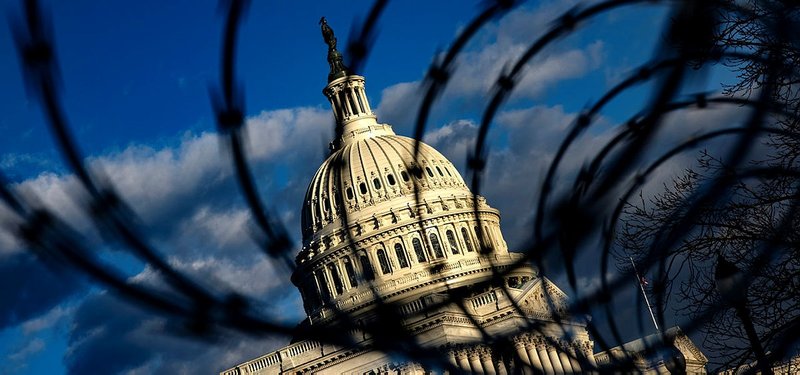
U.S. House to deliver Trump charge to Senate, triggering impeachment trial
- World
- Reuters
- Published Date: 02:00 | 26 January 2021
- Modified Date: 02:00 | 26 January 2021
The U.S. House of Representatives on Monday is set to formally deliver to the Senate a charge accusing former President Donald Trump with inciting insurrection in a speech to his supporters before the deadly attack on the Capitol, setting in motion his second impeachment trial.
Nine House Democrats who will serve as prosecutors in the trial are due to proceed at about 7 p.m. on Monday (0000 GMT) through the same building where on Jan. 6 a mob of Trump supporters clashed with police. The lawmakers will be carrying the charge - known as an article of impeachment - to the Senate ahead of a trial expected to start on Feb. 9.
The 100 senators are due to serve as jurors in proceedings that could result in Trump's disqualification from ever again serving as president.
Democrat Patrick Leahy, the Senate's longest-serving member, said on Monday he will preside over the trial.
Although the Constitution calls upon the U.S. chief justice to preside over presidential impeachments, a senator presides when the impeached is not the current president, a Senate source said. First elected to the chamber in 1974, Leahy, 80, holds the title of Senate president pro tempore.
Chief Justice John Roberts presided over the impeachment trial when the Senate, the controlled by Trump's fellow Republicans, acquitted Trump in February 2020 on charges of abuse of power and obstruction of Congress arising from his request that Ukraine investigate President Joe Biden and his son.
Leahy will still be able to vote in the trial, an aide said, noting that senators still vote on all matters when presiding over the chamber.
Some Republicans questioned the arrangement. "How does a Senator preside, like a judge, and serve as juror too?" Republican Senator John Cornyn asked on Twitter.
A number of Republican lawmakers have objected to the impeachment, some arguing that it would be a violation of the Constitution to hold a trial now because Trump no longer serves as president.
Senate Majority Leader Chuck Schumer, a Democrat, rejected this argument on Monday.
"The theory that the Senate can't try former officials would amount to a constitutional get-out-of-jail-free card for any president," Schumer told the Senate.
A ceremony similar to the one unfolding on Monday was carried out for Trump's first impeachment, when the House clerk and sergeant at arms led a small procession of lawmakers through a hushed Capitol to deliver two articles of impeachment to the Senate. Impeachment is a step akin to an indictment in a criminal trial.
Trump is the only U.S. president to have been impeached by the House twice and is set to become the first to face trial after leaving office. He left office on Jan. 20.
A DIVIDED SENATE
The Senate is divided 50-50, with Democrats holding a majority because of the tie-breaking vote of Vice President Kamala Harris. Senate leaders on Friday agreed to put off the trial for two weeks to give Trump more time to prepare a defense and let the chamber focus on Biden's early priorities, including Cabinet appointments.
The impeachment focuses on Trump's speech to supporters on a grassy expanse near the White House shortly before a mob stormed the Capitol, disrupted the formal certification of Biden's victory over Trump in the Nov. 3 election, sent lawmakers into hiding and left five people dead, including a police officer.
During his speech, Trump repeated his false claims that the election was rigged against him with widespread voting fraud and irregularities. He exhorted his supporters to march on the Capitol, telling them to "stop the steal," "show strength," "fight much harder" and use "very different rules."
Senate Republican leader Mitch McConnell and other lawmakers in the party have condemned the violence and some have accused Trump of inciting it. Republican Senator Mitt Romney told CNN on Sunday that the trial was necessitated by Trump's inflammatory call to his supporters.
Ten House Republicans joined Democrats in voting to impeach Trump on Jan. 13. Senate Democrats will need the support of 17 Republicans to convict him in the Senate, a steep climb given the continued allegiance to Trump among the Republican Party's conservative base of voters.
A Reuters/Ipsos poll on Friday found that 51% of Americans thought the Senate should convict Trump, breaking down largely along party lines.

